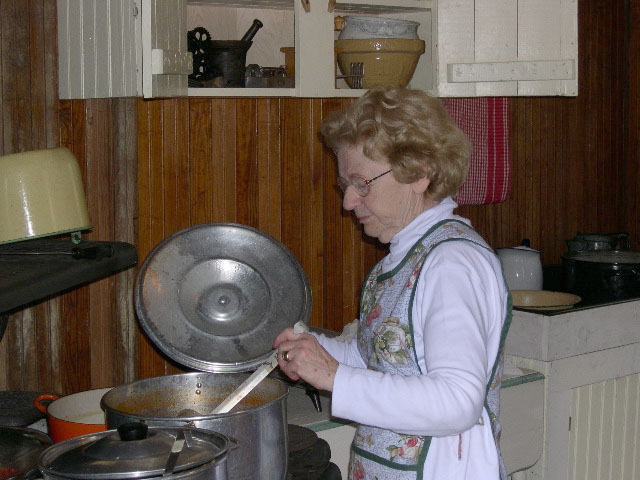
This article appeared more than 10 years ago in the Gazette. As Hanukkah commences, we’d like to pay tribute to somebody who contributed in so many ways to North Yarmouth Historical, especially enlivening two of NYHS’s beloved annual events. Happy Holidays, everybody!
. . .
Joyce Gilbert, an extraordinary volunteer for North Yarmouth Historical Society, died in early 2012 in Colorado. She and her husband Richard had moved there from their home in Cumberland several years before.
Joyce Glaser and Richard Gilbert were Bronx natives. They married in 1955 and raised two children. Richard was a music instructor and assistant school principal; Joyce was a teacher and a school librarian. She was also a talented baker!
Joyce and Richard retired here in their mid-50s. They found Cumberland after “poking into all the corners of Maine” during the summers when they worked at the Amherst Summer Music Center in Raymond—Richard as an instructor and Joyce as an accompanist.
After moving into their tidy home, they got right to work. They volunteered for the Lions Club and at MSAD#51. They joined the Cumberland Historical Society, and Joyce also felt drawn to North Yarmouth Historical Society, where she was warmly received. The research skills she had honed as a librarian were highly valued, as were her culinary and musical gifts!
The Gilberts participated fully in two annual NYHS events: Cider Day, and NYHS’s Christmas Party (to be revived in 2023!). Except that after Joyce got involved, Cider Day became SOUP and Cider Day, and the Christmas Party became the HOLIDAY Party. How did this come about?

First, the Cider Day challenge: A brisk fall day always brought out dozens of people to Old Town House to eagerly turn the crank of the old cider mill, while working up a good appetite. Joyce’s solution: Soup, and LOTS of it. Every year, Joyce made two enormous vats of minestrone and chicken noodle, and we NEVER ran out. In addition, the Gilbert station wagon always pulled up an hour before the event, loaded down with dozens of cookies and desserts, arrayed on trays. Thanks to Joyce, each SOUP and Cider Day became (and still is!) a great fall event.
And then there was the Old Town House Christmas Party challenge: For years, NYHS held an annual Christmas party at Old Town House. Of course Joyce showed up each year with plates of goodies … but what’s a party without music? And so she’d valiantly sit down at the piano and play Christmas tunes amid a happy hubbub of kids and parents.
However, this was a bit of a personal challenge—because Joyce happened to be Jewish.
She graciously accompanied singers who harmonized to “Away in a Manger” and “Silent Night.” BUT she gave equal time to some traditional Jewish tunes! She made sure that “Hanukkah, Oh Hanukkah” and “Dreidel, Dreidel, Dreidel” were part of the celebration, enjoyed by many who hadn’t had the chance to learn THOSE seasonal tunes.
And after several years, in tribute to dear Joyce, we deliberately changed OUR tune—making NYHS’s December event a little more inclusive by changing our Christmas Party to our HOLIDAY Party. And you can be sure that when the music commences a year from now that’s how we’ll advertise it.
. . .
Joyce’s gifts went far beyond music and cookies. Her archival research into the care of the poor in early North Yarmouth greatly enhanced our understanding of this issue.
If you were poor in the 18th and 19th centuries—elderly, without family, infirm, orphaned, disabled, bankrupt, homeless—the solution was to find someone to look after you, and that caregiver would be paid a stipend by the town. The town poor shifted around every year to those caretakers who could keep them for the smallest amount of money. (The expression “farm them out” has its origin in the care of the poor.)
Joyce “mined” town records for information about this forgotten population. The librarian found that this subject matter ran through all of our town’s records—in ledger books, letters, slips of paper asking for help, bills and receipts for the care of indigent residents. And the innate organizer in her decided to gather together all she could find. It was a tough self-assignment—not only because of the scattered information, but because some of the stories that could be gleaned from these primary documents were sad ones.
She took a deep interest in the people she met through the records and followed their history with sympathy. She was respectful of them, too; when she spoke about her research before an audience, she always kept her subjects anonymous, because, she noted, some of their descendants still lived locally.
Before moving to Colorado, Joyce wrote about her work. “For 15+ wonderful years I pored over the archives of the North Yarmouth Historical Society … I encountered a host of human emotions and problems, successes and failures … Judgemental at first, my emotions ranged from anger, sadness, amusement, and back again each hour I worked. Sometimes I was completely exasperated—e.g., when I discovered that poor people were “auctioned” to the lowest bidder … I cried when I read that complete families died within a week, of diseases that now are a distant memory.”
“After a time, the phrase ‘They did their best’ came to mind over and over and I did realize that in any point in history, people must act with what they have, not with a self-righteous view of a person sitting comfortably in the 20th or 21st century.”
A brain tumor took Joyce’s life, at age 77. It was hard to believe that a life of such energy and curiosity—one devoted to doing her very best—had ended. We miss her, and we thank her.
Happy Holidays to one and all!